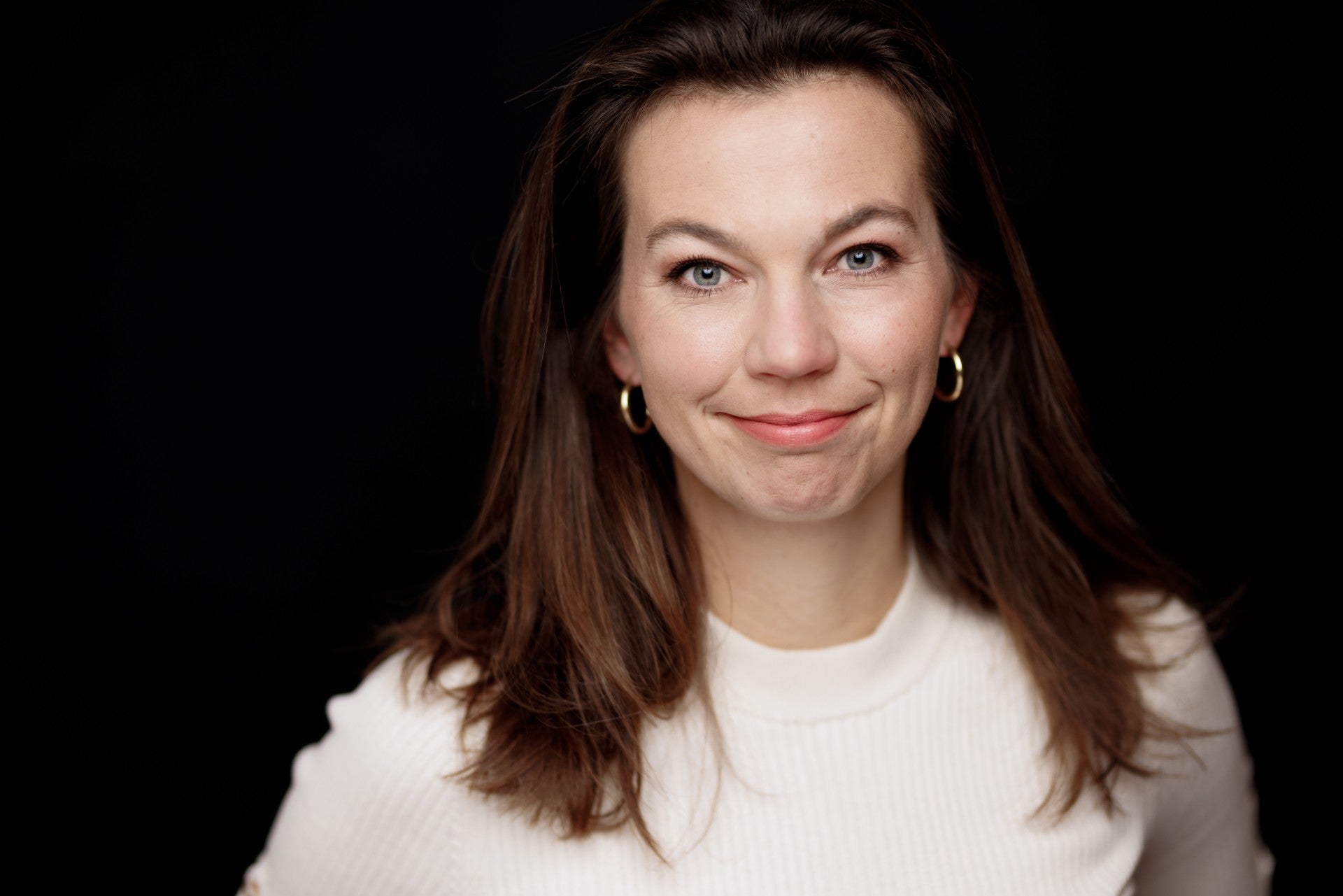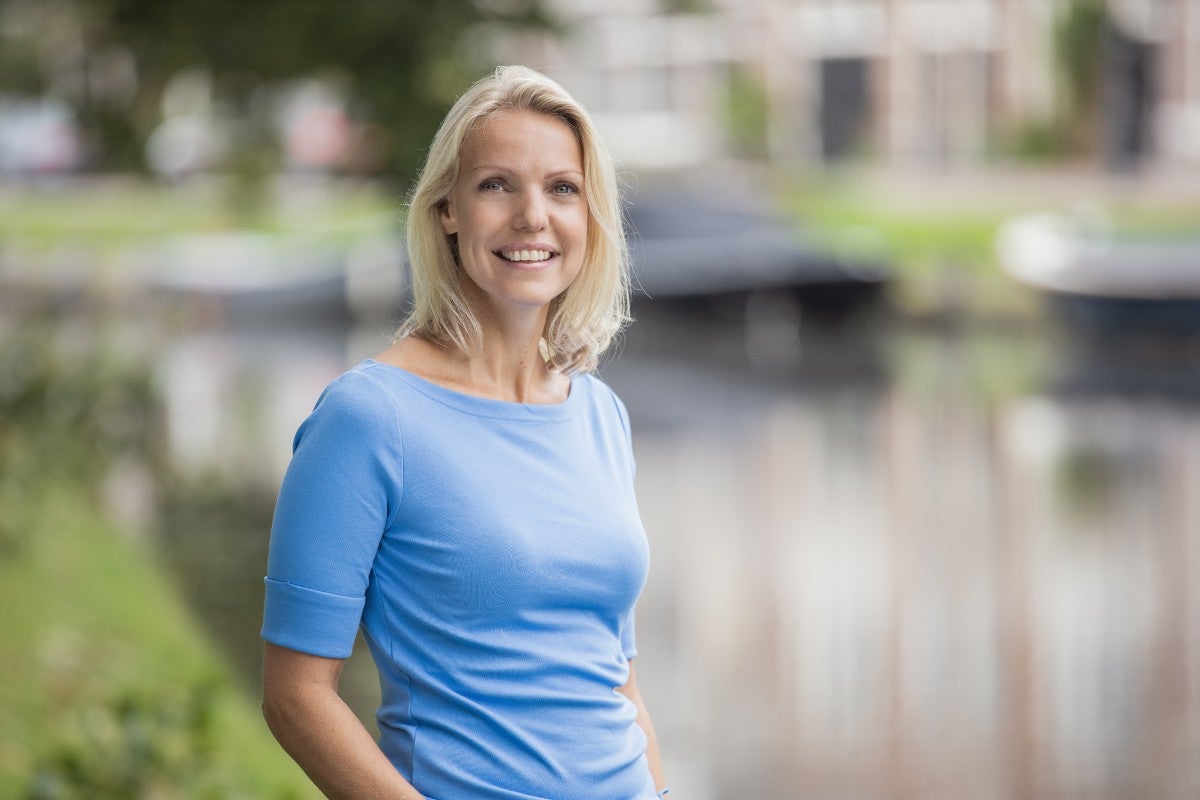NOS reporter Marleen de Rooy studied International Business Administration at VU Amsterdam. After several international experiences, she found her place in the political heart of The Hague, covering everything happening at the Binnenhof.
In the NOS studio in The Hague, within walking distance of the Binnenhof, currently under renovation, De Rooy begins the interview. „I have a little less time, as Minister Schoof is unexpectedly joining soon for an interview about nitrogen policy."
You're now on the other side of the table. How do you find that?
„A bit awkward, really. I'm used to asking questions, not answering them. The first time I was interviewed, I thought: huh? Why are we talking about me?"
Yet, since you also appear on talk shows, you've become a media personality yourself. 'Marleen de Rooy partner' or 'Marleen de Rooy children' turn out to be popular search queries on Google.
„That still feels strange. I really wonder why people would want to know that. But since we started the YouTube series ‘Rondje Binnenhof’, viewers get a slightly more personal picture of me. It’s different from just being a face on the news."
„During the COVID-19 period, things got tense. There was a lot of distrust towards the government, but also towards the media – and that hasn't entirely faded. People occasionally confronted me, accusing NOS of spreading fake news. When that happens at work, it’s one thing, but when you’re in the supermarket with your children, it feels different. Even now, people sometimes approach me, often because they’re worried about international developments."
„But there’s also a positive side. I receive messages, especially from young girls, who say they think what I do is cool and that they want to become political journalists too. I love that. It’s amazing to be able to inspire people in that way."
You didn't study journalism but chose the economics-oriented International Business Administration. Why?
„I always found economics interesting, but pure economics seemed a bit dry. Then I discovered International Business Administration, which attracted me, especially because of the many international students and the energy surrounding it – the feeling of: we’re doing something new."
„I perform well under pressure – if I know I have three hours left, I can really push myself to deliver."
„I often think back to the coffee corner downstairs at VU. That was the hangout, the place where you met everyone. I always studied in the canteen because I can’t work well in very quiet spaces. I need background noise and activity to concentrate."
"When I first arrived at the NOS newsroom, I immediately felt: this is where I belong. Everyone was constantly on the phone, reading documents, there was movement. In such a dynamic environment, I thrive. I perform well under pressure – if I know I have three hours left, I can really push myself to deliver."
Do you still get nervous before interviews?
„Not for interviews, no. But sometimes before going live. It’s that realisation: this is live, there’s no second chance. You stand there, looking into the black hole of the camera, knowing everything you say is going out to the world in real time. That’s intense. Especially in the studio. You hear the countdown: three, two, one… and then the NOS Journaal tune. In that moment, I think: what am I actually doing? But you have to push that thought aside immediately and trust your preparation. It’ll be fine."
„And if something happens – you have to cough, a siren blares, or you lose your train of thought – you know: don’t panic. Look down for a second, recover, and continue. That’s the most important thing: stay calm and carry on."
How did you ultimately decide: I want to be a journalist?
„Initially, I never thought about journalism. After my studies, I went to Australia and worked at a finance office in Sydney. I planned to stay for six months, but it turned into almost ten. I had a great life there – I lived on Bondi Beach, had a fun group of friends, and the job was fine. But I realised: if I have to do this for the rest of my life, I won’t be happy."
„Ik dacht echt: wat doe ik hier? Ik heb mijn moeder gebeld en gezegd: 'Mam, ik weet helemaal niet of ik dit wel kan.'"
„I had written for my student magazine in Amsterdam and always enjoyed it, but I didn’t know any journalists. To me, it was an elusive profession: how do you even become one? It didn’t seem like something you could just do. That changed when I enrolled in a journalism master’s in London. Suddenly, I was in class with students from all over the world – people who had already written for The Guardian and Vanity Fair. I really thought: what am I doing here? I called my mum and said, ‘Mum, I’m not sure I can do this.’"
„But after two weeks, we had to make a newspaper, and then it clicked. When it came to section assignments, no one wanted to cover business and finance. So I raised my hand. That was the moment I realised: maybe this is my strength. My economics background was different from the rest. That’s why I was accepted, and this is what I can contribute."
How did you become a reporter at NOS?
„I first applied to Het Financieele Dagblad and was unexpectedly hired, so I had to return to the Netherlands. I was 25, still living with friends, and suddenly had a far too serious job at a newspaper where every detail had to be perfect. In those early days, I made a huge mistake: I put the wrong number in an article. I was so upset that I cried in the bathroom."
„At some point, I got in touch with someone from NOS and was given a tour. That’s when I immediately knew: this is it. The newsroom, the energy, the chaos of live news – this was where I wanted to be. Shortly afterwards, I made the switch and joined the economics desk."
„The newsroom, the energy, the chaos of live news – this was where I wanted to be."
„My background in finance immediately gave me a strong foundation. I may not have known much about politics, but I knew everything about topics like capital gains tax, pensions, and taxation. During the government formation, I realised I needed to find out what they were planning to do with the tax system. I spoke to as many people as possible, pieced all the bits together, and at some point, I just knew. Not because someone had told me directly, but because it was the only logical conclusion. That was my first major scoop—it became the lead story on NOS Journaal."
If you were to write an autobiography, which memorable media moments would definitely be included?
„One moment that would certainly be in it is that Friday in November (2024, ed.) when the cabinet almost collapsed. It was a quiet day—or so I thought. I was supposed to have a conversation with Schoof, nothing special. I was just wearing a denim dress and hadn’t even considered that I might end up on TV."
„Then I got a phone call: ‘Nora is resigning today.’ (NSC State Secretary Nora Achahbar, who stepped down due to her dissatisfaction with the migration debate, ed.) My first reaction was: you’re kidding. But then I immediately thought: if she’s resigning, the rest probably won’t stay either. This just means the end of the cabinet. It was 12:45, and I was literally standing in this room. At that moment, I ran to Xander (Van der Wulp, ed.) and shouted, ‘Wow, wow, wow!’ And right at that moment, he also got a signal that something big was about to happen."
„From that moment on, everything moved incredibly fast. The entire newsroom sprang into action, everyone started making calls. It was chaos - but controlled chaos. And at exactly 1:00 PM - just fifteen minutes after the news reached me - I was already in the studio reporting it."
What do you think are the biggest challenges facing journalism today?
„One of the biggest challenges is transparency. With 'Rondje Binnenhof', we try to show how we as journalists operate. Viewers appreciate that because it makes journalism feel less distant. Instead of ‘them over there in The Hague,’ it becomes more like: look, this is how we do it, this is how we work. We are just people too, just like the politicians we report on. That openness helps build trust and bridge the gap between journalism and the public."
„How do you communicate with someone who has spent their entire life in a completely different information ecosystem?"
„I also think the Eight O’Clock News is so important: it lets you hear things you might not have realised you needed to know. In an age where algorithms determine what you see, there’s a real risk of getting stuck in a bubble. You and I still have a foundation to fact-check information, but what about children? How do you communicate with someone who has spent their entire life in a completely different information ecosystem? That worries me."
Finally, do you have any advice for aspiring journalists?
„Try to truly master one specific area within the broad spectrum of politics. That will set you apart. Whether it’s youth care, the benefits scandal, or pensions – the better you understand a particular topic, the more you grasp the underlying systems. It gives you a foundation, helping you not only understand relationships but also how policies and decision-making actually work. From that base, you can always expand. Once you fully comprehend one complex system, it becomes easier to connect the dots and explore new areas."
„And a personal tip: if you plan to be on TV, always have a spare set of clothes with you. I once spilled an entire cup of coffee on myself just before going live. Luckily, I had just enough time to run to a shop around the corner, but it didn’t exactly make the interview any more relaxed."







